City of Winder

POPULAR ANNUAL FINANCIAL REPORT FY21/22
LEADERSHIP STEWARDSHIP MOMENTUM



POPULAR ANNUAL FINANCIAL REPORT FY21/22

The Popular Annual Financial Report (PAFR) is designed to provide citizens and other interested parties with a user-friendly overview of the City’s financial results and increase awareness of the City’s audited financial statements contained within the 2021 and 2022 Annual Financial Reports. The 2021 and 2022 Annual Financial Reports were audited by Rushton and Company, LLC and have received unmodified or “clean” audit opinions.
The PAFR does not present the same level of detail as the Annual Financial Report. Rather, it will serve as a highlight reel of the overall financial condition and trends of the City. Any financial data presented in this report is derived from the City’s financial statements but may include summarization and combinations of accounting data that would not be in accordance with Generally Accepted Accounting Principles. For a detailed financial statement please refer to the City’s audits available online at CityofWinder.com/Budgets
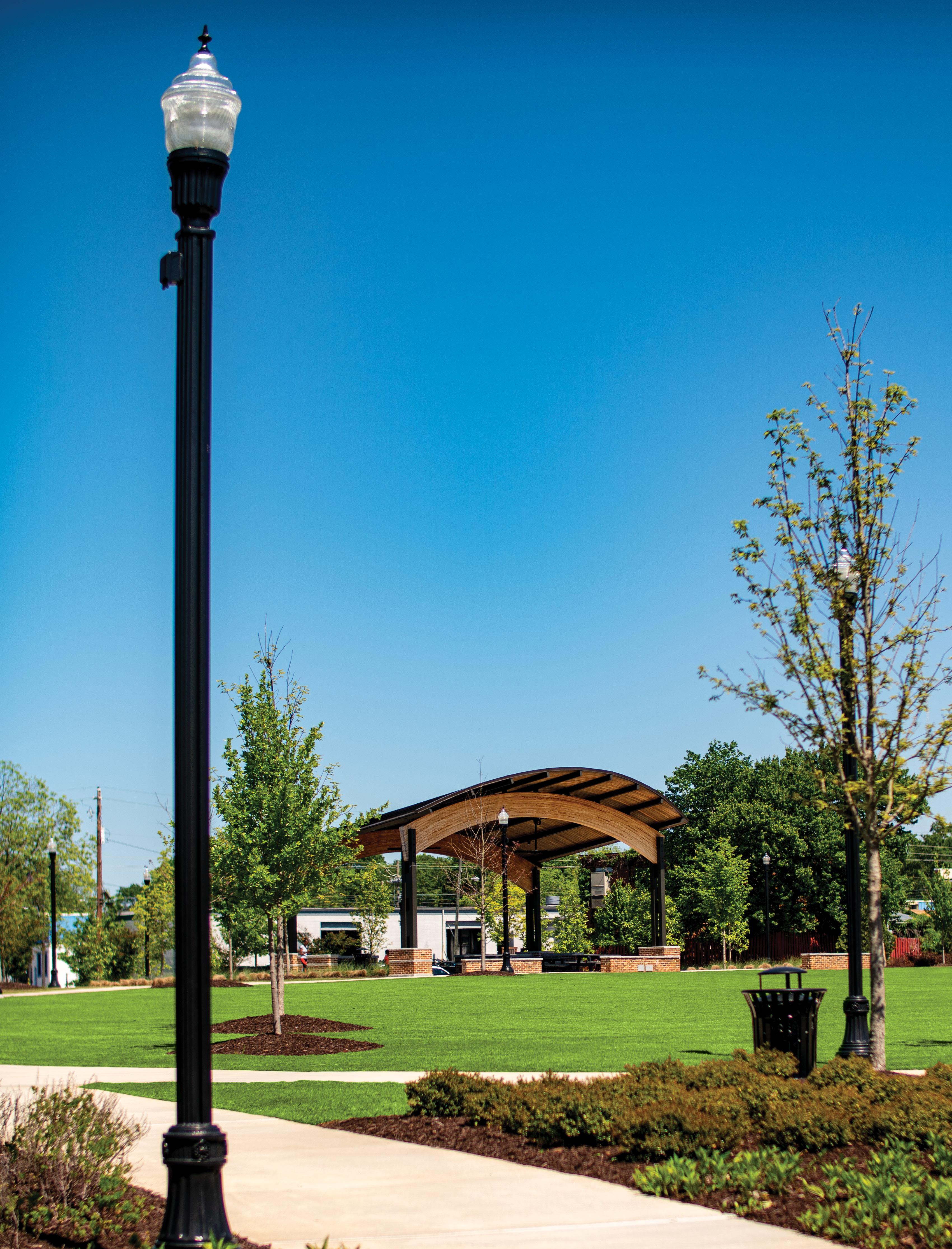


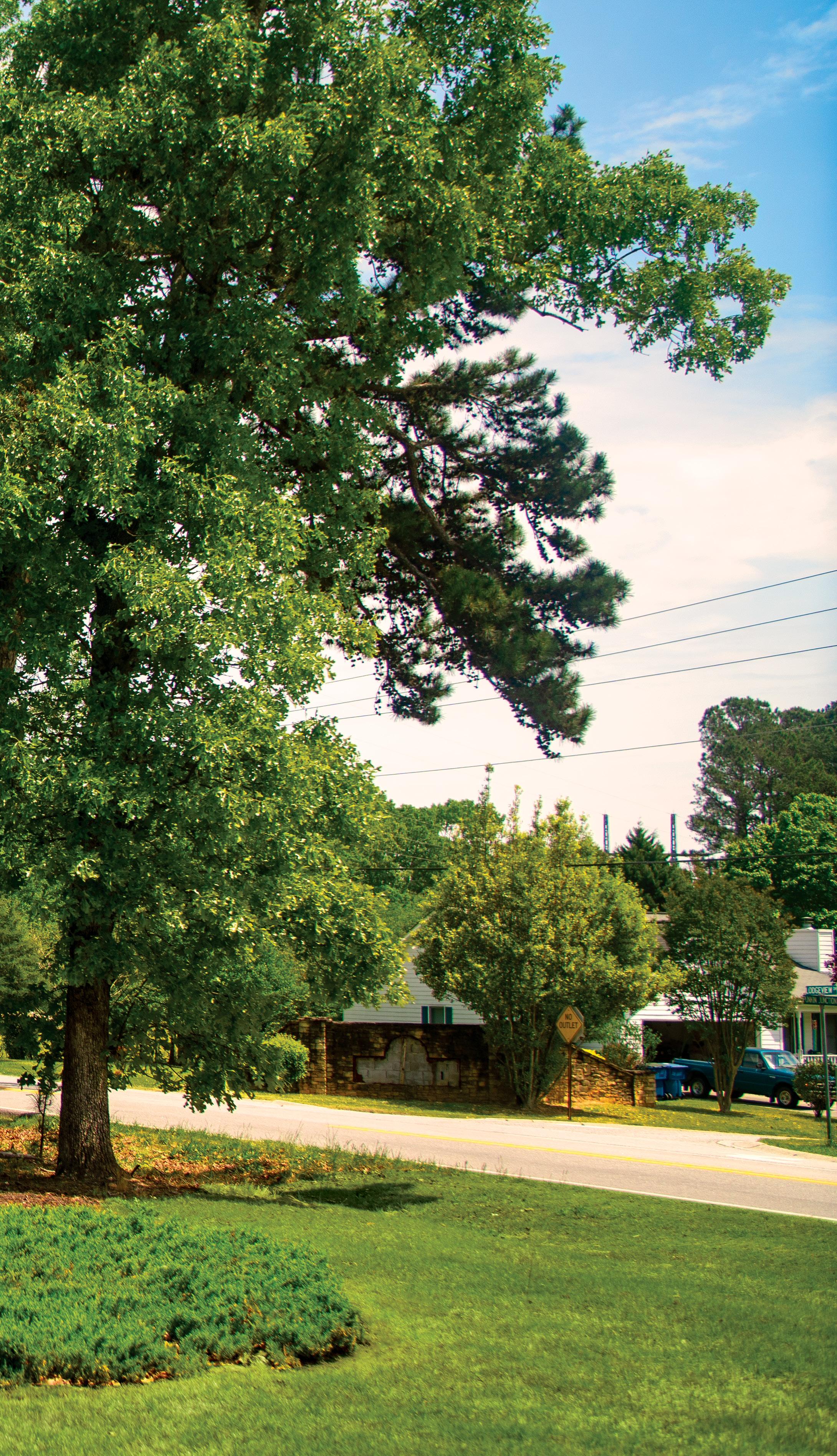
The City of Winder is a mayor-council form of government with an appointed City Administrator who oversees dayto-day operations in a manner that implements the vision, policies, and priorities of the Mayor and Council.






The Mayor and two City Council members are elected at-large (city-wide), and the remaining four Council seats are elected by residents in specified wards inside the City limits. All elections are non-partisan. The Mayor and Council serve four-year staggered terms, meaning not all seats are up for election at the same time.
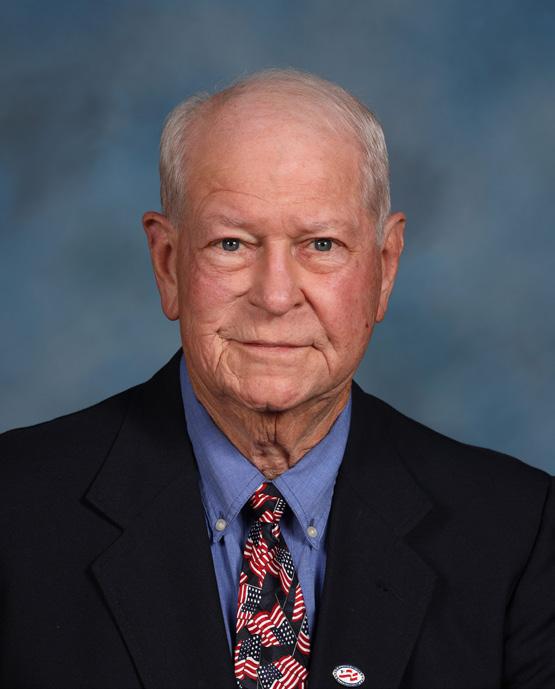 Sonny Morris WARD 1
Jimmy Terrell WARD 3
Stephanie Britt AT-LARGE
Kobi Kilgore WARD 2
Travis Singley WARD 4 / MAYOR PRO TEM
Shannon Hammond AT-LARGE
Sonny Morris WARD 1
Jimmy Terrell WARD 3
Stephanie Britt AT-LARGE
Kobi Kilgore WARD 2
Travis Singley WARD 4 / MAYOR PRO TEM
Shannon Hammond AT-LARGE
CITY LEADERSHIP TEAM
Roger Wilhelm
ASSISTANT CITY ADMINISTRATOR OF PLANNING AND UTILITIES
Anna Childs CITY CLERK
Tabatha Knight DIRECTOR OF UTILITY OPERATIONS
Beth Reynolds DIRECTOR OF DEVELOPMENT SERVICES
Rachel Bembry CHIEF FINANCIAL OFFICER
John Rorke
CHIEF INFORMATION OFFICER
Kristin Edwards DIRECTOR OF SPECIAL EVENTS
Michelle Hawley
CUSTOMER SERVICE MANAGER
Clint Cannon PUBLIC WORKS DIRECTOR
Gerard Brewer CITY ENGINEER
Elizabeth Clarkson GOLF COURSE MANAGER
Jim Fullington POLICE CHIEF
Matt Whiting FIRE CHIEF
The annual budget is the most important policy document approved by the Mayor and Council each year. Embedded within it are the vision, goals, and service expectations that the Mayor and Council seek for the City. For Fiscal Year 2022 (FY22), the Council formally began the process of identifying these priorities at a January 2021 retreat. To ensure that these goals and expectations were delivered to the citizens and customers of the City of Winder in the most cost-effective manner, City Council adopted Winder’s first outcome-based budget, also known as a performance-based budget, for FY22.

As part of the performance-based budgeting process, budgets are developed based on the true cost of delivering the service rather than adding to or taking from historical spending patterns. Cost centers are identified, and a close analysis of rate structures to support those cost centers is undertaken. This ensures that services provided for the benefit of a single user are paid for by the rates charged for that service, and not the property taxpayer. Thus, property (and other taxes) are used to benefit the entire community, rather than subsidizing an individual customer.
In addition to adopting performance-based budgeting with rate supported cost centers, Council also approved the City’s first five-year Capital Improvement Plan (CIP) in FY22. A CIP identifies all significant investments in land, buildings, infrastructure, equipment, and fleet that the City will require over the next five years in order to ensure that assets are maintained and funding is appropriated within successive annual budgets.
The City of Winder manages its finances by dividing them into different funds, which are like separate bank accounts for different purposes. Each fund is a self-contained unit that keeps track of the money coming in and going out, along with any debts or assets. These funds are created to follow State and Federal regulations, restrictions, or limitations, and are separated based on specific activities or objectives. For each fund, the revenues (money coming in) must match the expenses (money going out) to keep a balanced budget.
In FY22, Council created Special Revenue Funds to account for important community goals such as Rose Hill Cemetery, the Winder Library, and the hosting of community events and festivals. These activities and their associated revenues and expenditures were separated from the General Fund to allow for proper cost tracking and use of assessments and rates to support these endeavors
Additionally, contracts for public works programs were required to identify fund-based cost centers for proper rate recovery and mitigation of reliance on the property tax and other general fund revenue sources.
Breaking out funds and isolating their individual activity allows for more accurate reporting with the intention of formulating fees and rate structures that support the service.
Council and staff also undertook several initiatives in financial accuracy in FY21 and FY22, including:
• Recorded internal debt balances and budgeted for its repayment.
• Budgeted transfers and recorded quarterly.
• All bank accounts reconciled in financial software.
• Implemented new budget software
• Rates and fees restructured and new rates for services implemented for several general fund services, especially in planning, permitting, inspections, events, and rental of special facilities
• Eliminated $50 street light assessment fee from tax bill

Located in Barrow County, Georgia the City of Winder has been serving its residents since 1893, 130 years. With a population estimate of almost 19,000 according to recent census data, Winder has grown more than 23% in population since 2010 and continues to welcome new residents and businesses each year. Known as the City of Opportunity, Winder is an energetic community that prides itself on hosting opportunity for all. Winder is a hub for commerce, industry, and culture in the region known for its strong sense of community and commitment to serving the needs of its residents with excellence.
BETWEEN 2019 AND 2020, the median property value in Winder increased by 6.58%, from $162,700 to $173,400.
HOMEOWNERSHIP RATE AS OF 2021
6,444 HOUSEHOLDS
2017-2021
68.9% MEDIAN VALUE OF OWNER-OCCUPIED HOUSING UNITS, 2017-2021 $191,100
$57,708 MEDIAN HOUSEHOLD INCOME:
SOURCE:www.census.gov/quickfacts/windercitygeorgia
Date of Incorporation: JAN 1, 1893
Land Area: 13.69 SQ MILES County: BARROW
Total Adopted FY 2023 Budget: $81,965,073
Population: 18,338
Median Age: 37.1 Median Household Income: $57,708
Per Capita Income: $25,772
Median Home Sales Price: $173,400 Average Household Size: 3.24
Percentage of Single Households: 41.6
Percentage of Married Households: 48.6
Percentage of Families with Children: 49.1
SOURCE: US Census Bureau
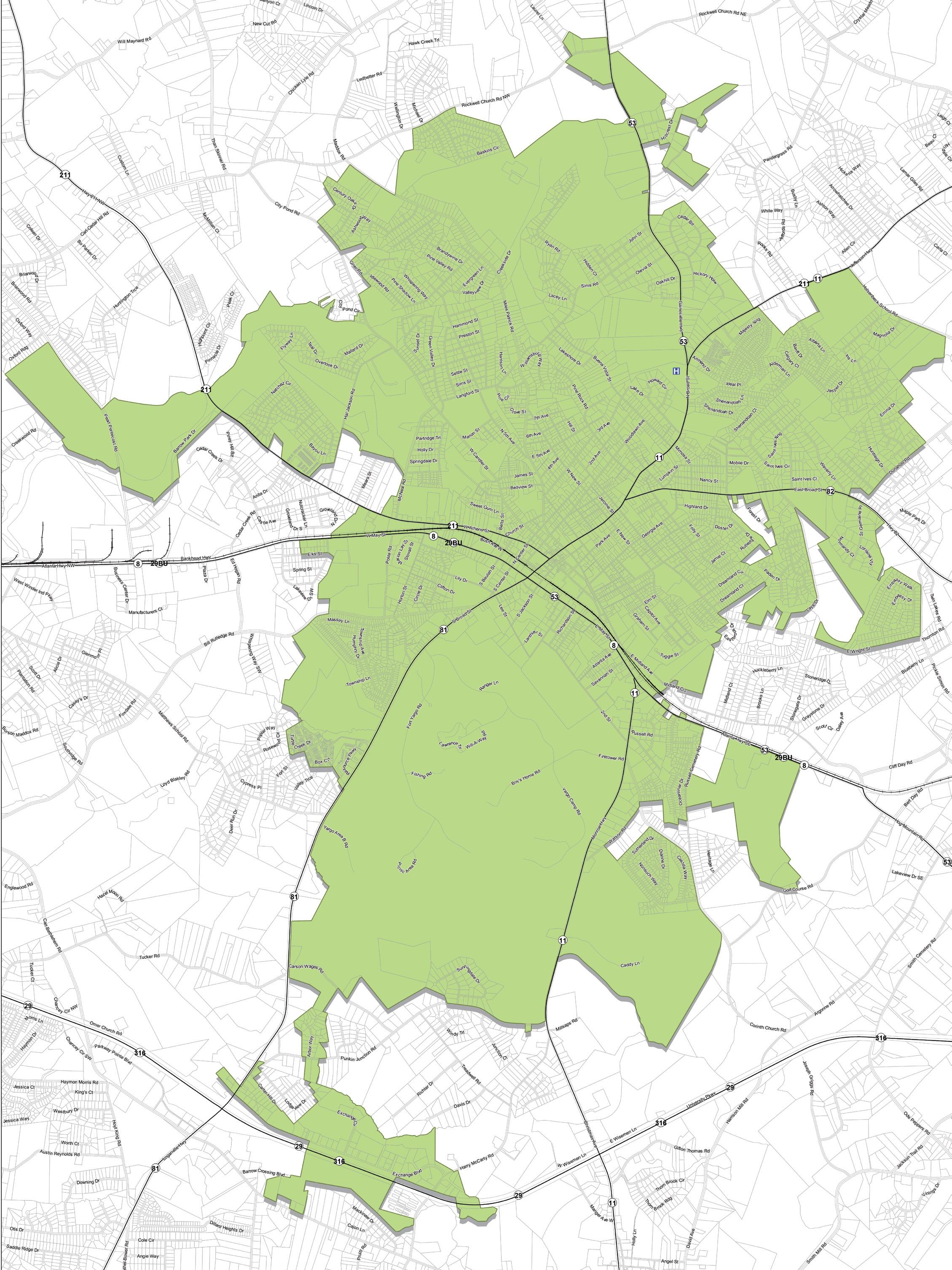
This section is designed to provide “the big picture” on the City of Winder’s financial wellbeing and the value of the City as a whole to demonstrate how available resources are utilized to provide services to Winder residents and customers.

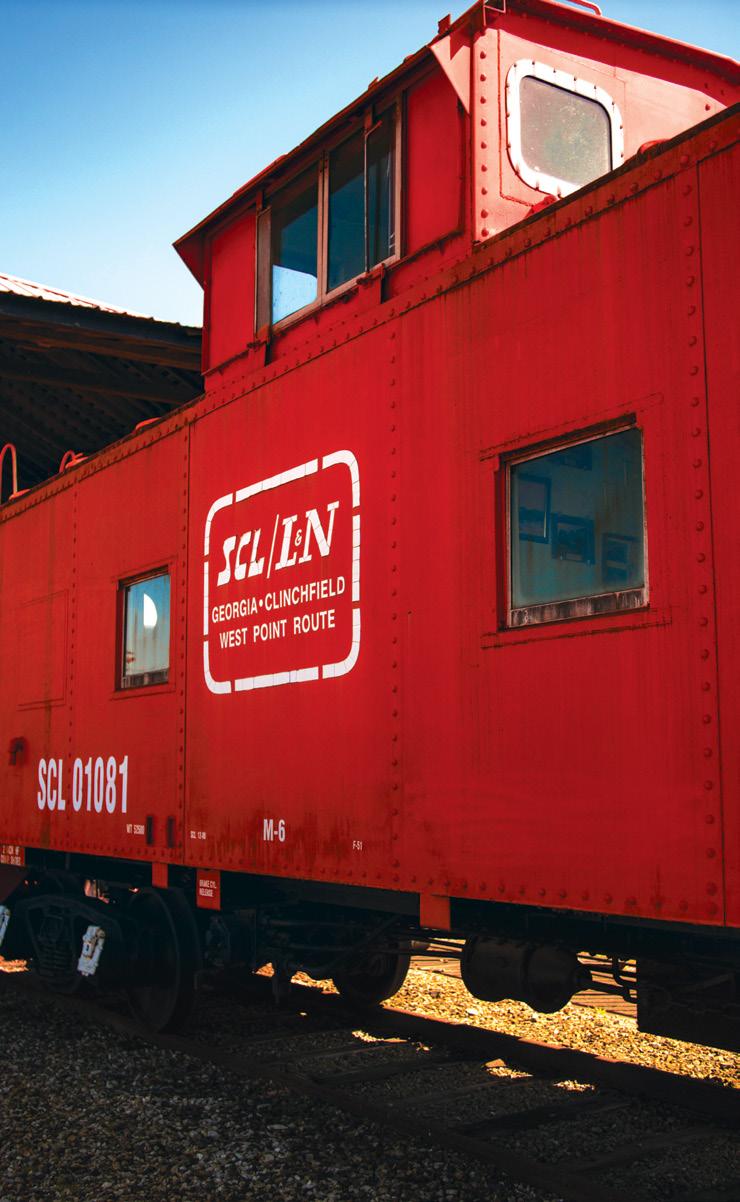

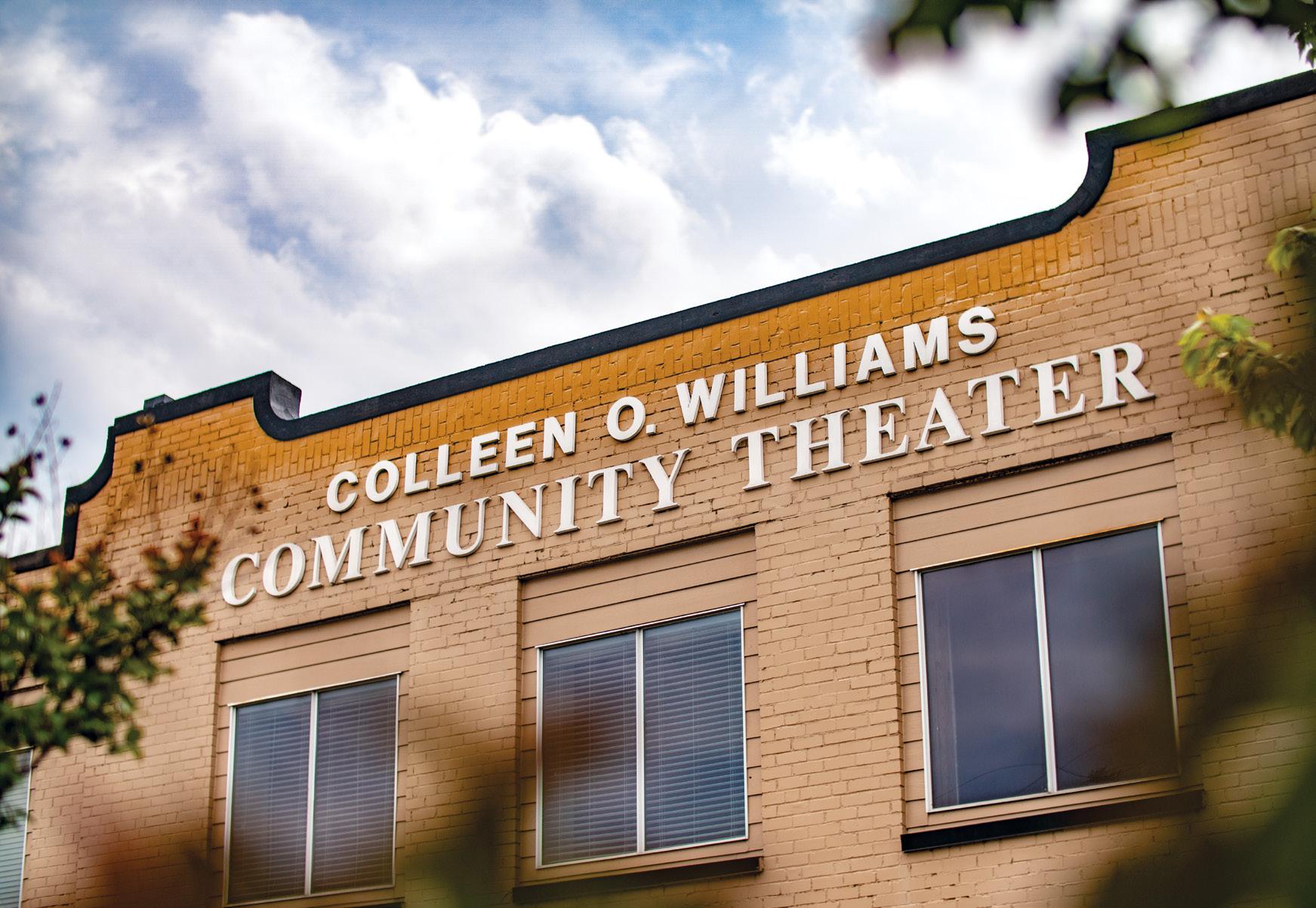
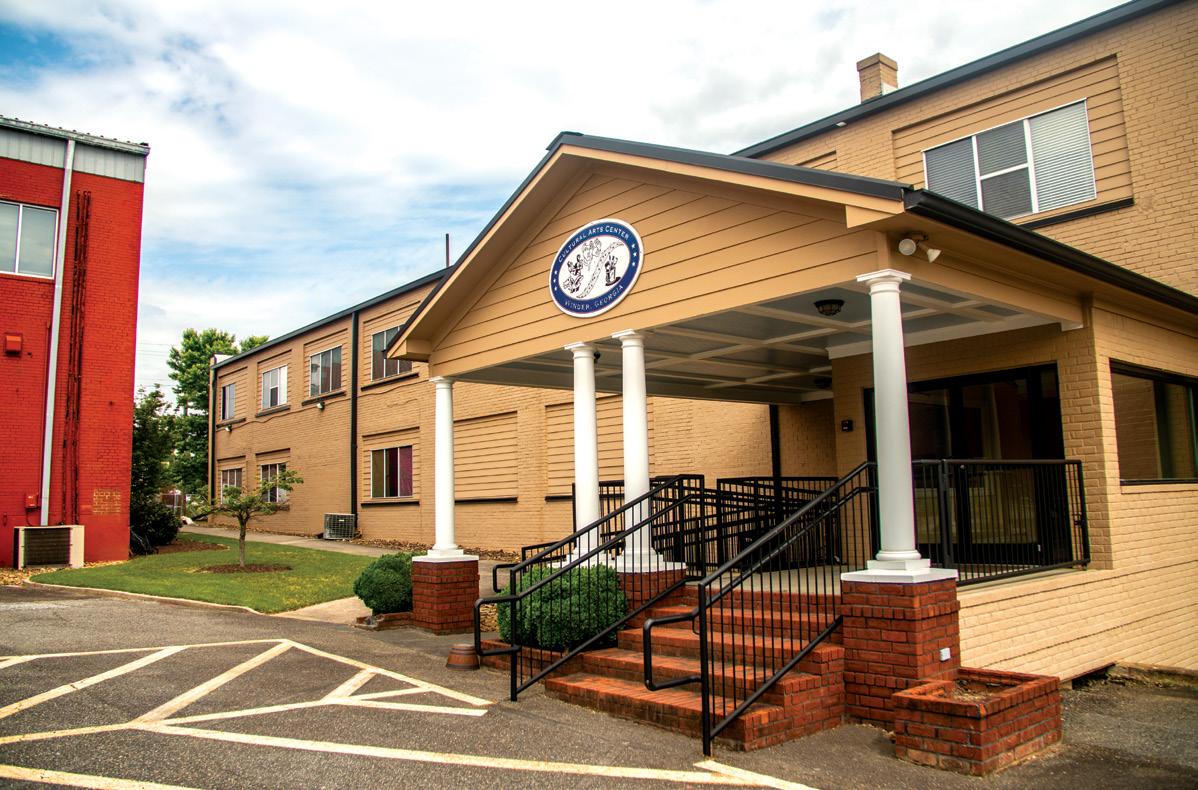
Net position, also known as a balance sheet, provides a snapshot of what the City currently owns (assets) and owes (liabilities), as well as sources (deferred inflows) and uses (deferred outflows) that will be recognized in future years. Increases or decreases in net position may serve as a useful indicator of whether the City’s financial position is improving or declining.
Governmental Activities
Business-Type Activities
Each fund within the City of Winder has different needs and spends money on various expenses. These expenses may include personnel costs, capital investments, contracts, maintenance, and debt service. The other pages in this document will provide more detailed information about spending for different funds.
For clarity, the General Fund has been broken out into functional areas: General Government, Housing and Development, Judicial, Public Safety, and Public Works.
Different types of funds, such as General Funds, Enterprise Funds, and Special Revenue Funds, have varying sources of revenue. Enterprise Funds, which are operated much like business enterprises, receive most of their revenue from charges for services, while the General Fund, which provides government services for the general benefit of the community, relies mainly on property and sales taxes.

The General Fund accounts for resources devoted to support the services associated with local government. Programs resident in the General Fund are general administration, public safety, public works, and any other activity for which a special fund has not been created.
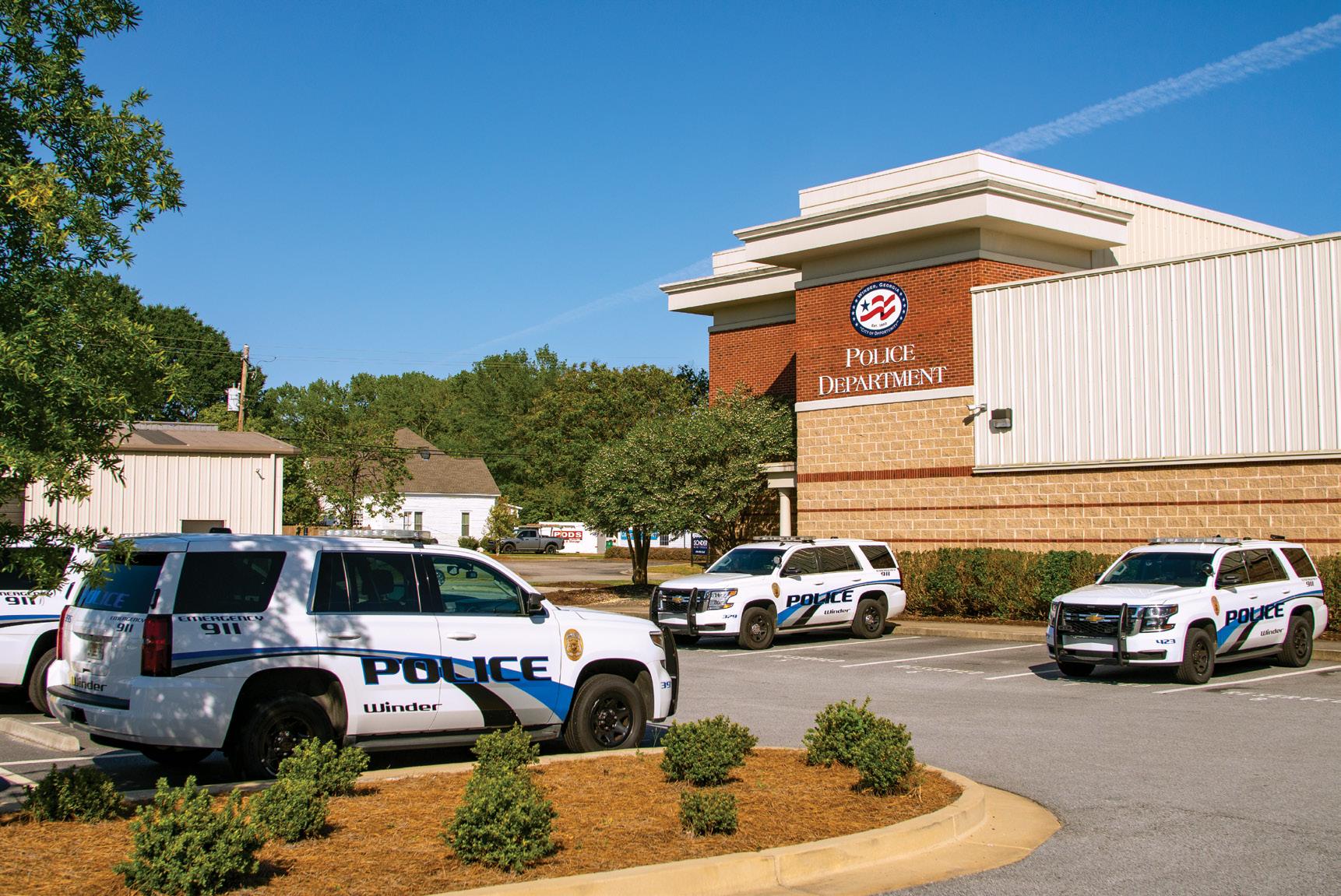
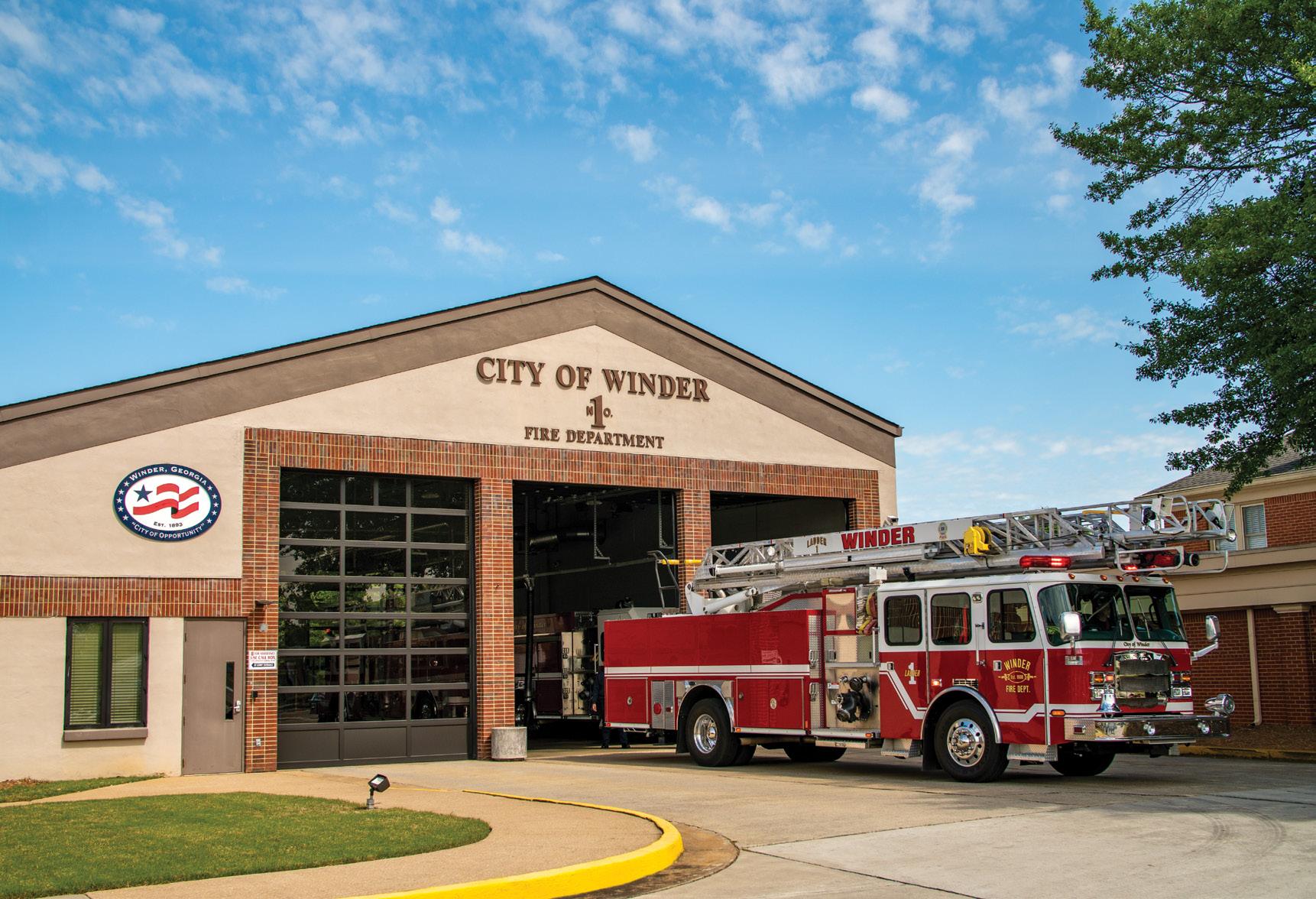
Looking at key financial ratios and trends over several years enables the City to have a clearer picture of where it has been and where it is going.
These ratios are used to identify and quantify the positive and negative impacts of the City’s financial practices over time.
The governmental funds rate is generally good in all ratios except for the capital asset condition ratio. Additionally, plans for FY24 include several asset investments to address these issues, such as the addition of the General Government Buildings and Plant department to track facility costs and funding for the City Hall needs analysis and Cedar Creek Master Plan.
Total Margin Ratio focuses on whether the government lived within financial means during the fiscal year. A ratio of 1.0 or higher is desired.
% Change in Fund Balance focuses on the extent to which the financial position improved or deteriorated. A positive percentage change is desired.
Quick Ratio focuses on the ability meet short-term obligations and is a measure of the government’s liquidity. A ratio of 1.0 or higher is desired.
GOLD STATUS 19 YEARS OF CONSECUTIVE ACCREDITATION AS A STATE CERTIFIED LAW ENFORCEMENT AGENCY (2022)
DISTINGUISHED BUDGET PRESENTATION AWARD FY 2022
CERTIFIED CITY OF ETHICS BY THE GEORGIA MUNICIPAL ASSOCIATION
CLASSIC MAIN STREET COMMUNITY
Net Position Ratio focuses on the ability to meet long-term obligations and is a measure of the government’s solvency. A high ratio is desired.
Debt to Assets Ratio focuses on the extent to which total assets are financed with long-term debt and is a measure of the government’s leverage. A lower ratio is desired as a high ratio implies an over reliance on debt for financing assets.
Capital Assets Condition Ratio focuses on the condition of the capital assets in relation to the remaining useful life. A high ratio is desired as it implies the government is investing in capital assets.
OUTSTANDING SERVICE AWARD, COVID-19 AMERICAN RED CROSS, 2020
HEALTHY WORKFORCE DESIGNATION
CIGNA, 2021
SILVER LEVEL HEALTHY WORKFORCE DESIGNATION
CIGNA, 2022
Property taxes make up 29.6% of all revenues in the General Fund. These taxes are called ad valorem taxes, which means they are based on the assessed value of the property, including land, buildings, permanent fixtures, and any improvements made on the property.
Your Property Tax Bill
A millage rate, or the tax rate, is approved by City Council and applied against the assessed value of property (which is 40% of market value as determined by the Barrow County Tax Assessor). This is the amount property owners pay to support general governmental services. Winder’s property tax is billed and collected by the Barrow County Tax Commissioner along with several other taxing authorities.
x 40% = Assessed Value
– Exemptions = Taxable Value

Millage Rate* = Property Tax Amount
*Winder Millage Rate, FY22: 6
The line item identified as “Winder” is your City of Winder property tax bill. Just 15% of this tax bill! (That’s only $1.21 per day to support roads, police, fire, parks, and general services
Only 15% of the total bill!
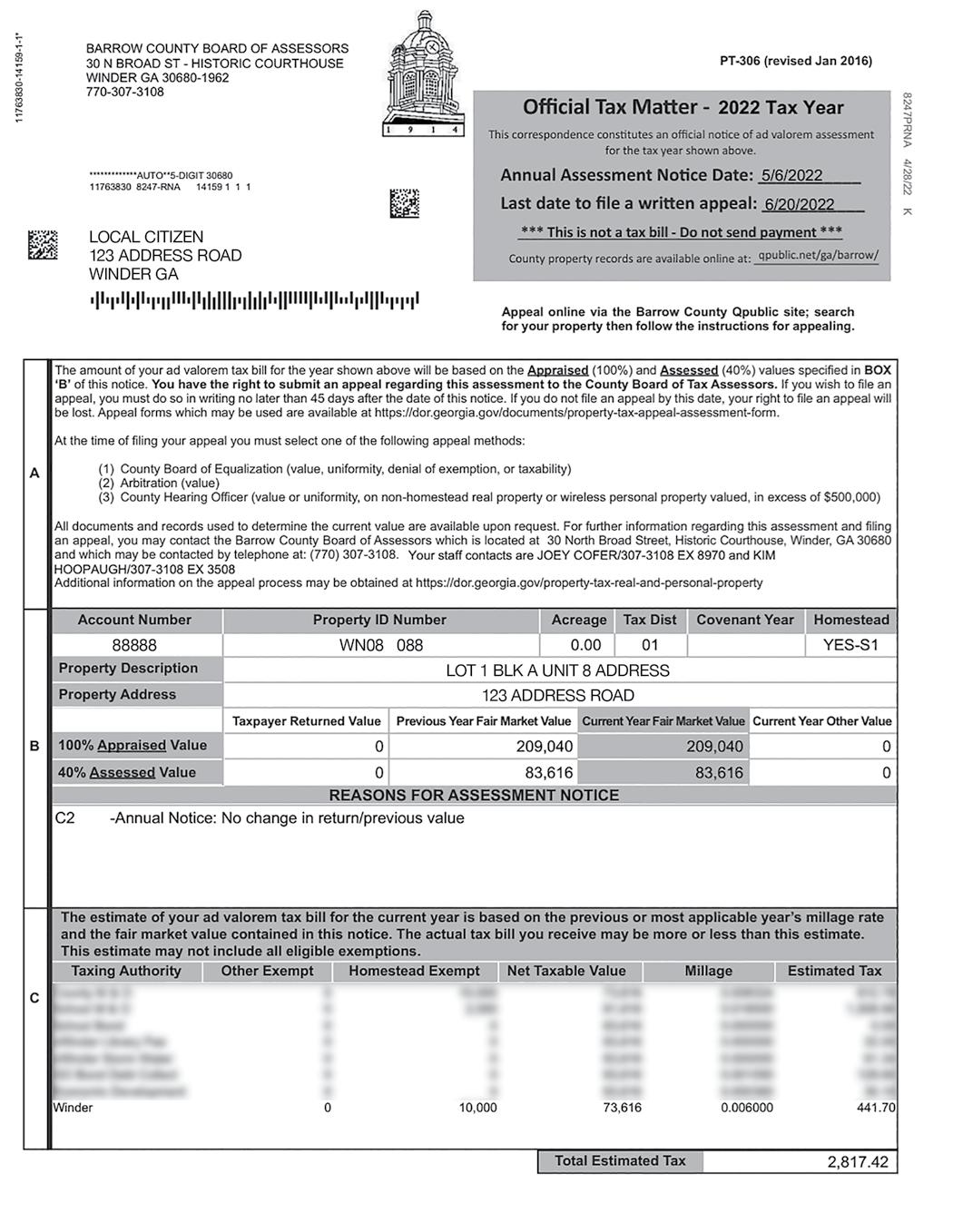
In FY2022, Council made the difficult decision to increase the property tax millage rate in order to improve the quality of services being provided to the residents of Winder and to decrease the dependency of the general fund on transfers from the water sewer enterprise fund. This was necessary, in part, to maintain the fiscal health of the water sewer fund. Real & Personal Property Taxes Sales Taxes
Between Fiscal years 2016 and 2020, the water sewer enterprise fund transferred an average of $3,886,033 per year. Council reduced this transfer to only $1,804,604 in FY21.
Property taxes and other general fund revenues provide general governmental services such as police, fire, parks, public spaces, streets, landscaping, and streetlights.
Personal Services - 58.8% Operations - 40.5% Capital Outlays - 0.2% Debt Service - 0.4% Transfers Out - 0.2%
Fund balance, by definition, is the excess of assets of a fund over its liabilities, reserves and carryover. Assets are resources which have monetary value, owned or held by a government. Liabilities are future spending of revenue as a results of past transactions and other past events. Fund balance, for the General Fund, is similar to a savings account. It is the amount of money set aside to respond to emergency situations or meet unexpected expenses. The General Fund’s fund balance is one indicator of fiscal health. It is recommended that a city maintain the equivalent of three months or twenty five percent of operating expenditures in unassigned fund balance.
Fund Balance has several classifications: Non-spendable: the portion of the fund revenue over expenditures that is available to be invested but not spent.
Restricted: the portion that can be spent only for specific purposes stipulated by enabling legislation.
Assigned: the portion of the fund balance reflecting the government’s intended use of resources, with the intent established by government committees or officials in addition to the governing board.
Unassigned: the remaining portion of fund balance that has not been assigned to other funds and that has not been restricted, committed, or assigned to specific purposes within the general fund.
• Staffed several key positions to professionalize operations and service delivery, including Information Technologies, Engineering, Planning, and Finance.
• Implemented recruitment and retention programs for the police and fire departments, including night shift deferential and POAB dues as benefit enhancements.
• Maintained 19 straight years of State Certification for the Winder Police Department.
• Maintained ISO Class 2 Rating for Winder Fire Department.
• Prepared and adopted a master plan for the Downtown Development Authority district.
• Prepared and adopted a master plan for Rose Hill Cemetery.
To better serve our constituents, Council initiated several operational and service goals for FY21 and FY22 that were funded and accomplished.
• Redesigned of all public works services, including downtown landscaping and right of way maintenance and mowing.
• Implemented street sign removal and replacement program to reduce visual clutter, enhance safety, and create a sense of place.
• Implemented funding for pothole repair program.
• Implemented project management system for licensing and permitting programs, including creation of Development Team and online application and fee payment systems.
• Adopted zoning and other ordinances, plan reviews, and inspection processes to enhance the quality of the built environment and land use.
• Funded and hosted Spooktacular, Christmas Parade, and other community events.
• Evaluated the Pavement Condition Index (PCI) for all City streets. Adopted Street Paving and Management Policy to extend Annual Lane Mile Year Service Life and funded policy through $200,000 Georgia Department of Transportation grant funds and dedicated $1 million of Special Purpose Local Option Sales Tax (SPLOST) dollars to implementation.
Per an agreement with the Barrow County Board of Commissioners, the City of Winder assumed ownership of the library building located at 189 Bellview Street in 2020 and began assessing Winder residents a $32 per residential equivalent unit assessment on annual tax bills. In FY22, the City of Winder created a Special Revenue Fund to host and account for the receipt and spending of this assessment.
Special Revenue Funds were also created in FY22 for Rose Hill Cemetery and City Festivals and Events. For Rose Hill, an objective was to create a proper cost center of accounting for establishment of fees and demonstrate required tax payer support (transfers from the General Fund) to care for the cemetery grounds.
For Events, a Special Revenue Fund accounts for event fees, sponsorhip contributions, and transfers from the Hotel/Motel Tax Fund and ensures that the fund is not supported by property taxes.
An enterprise fund is operated like a private business, also known as an enterprise, where a fee is charged for goods and services. The City of Winder operates enterprise funds for Water and Sewer, Gas, Stormwater, Sanitation, and the Chimneys Golf Course. These funds are operated independently of the general fund and without support from property or other taxes.
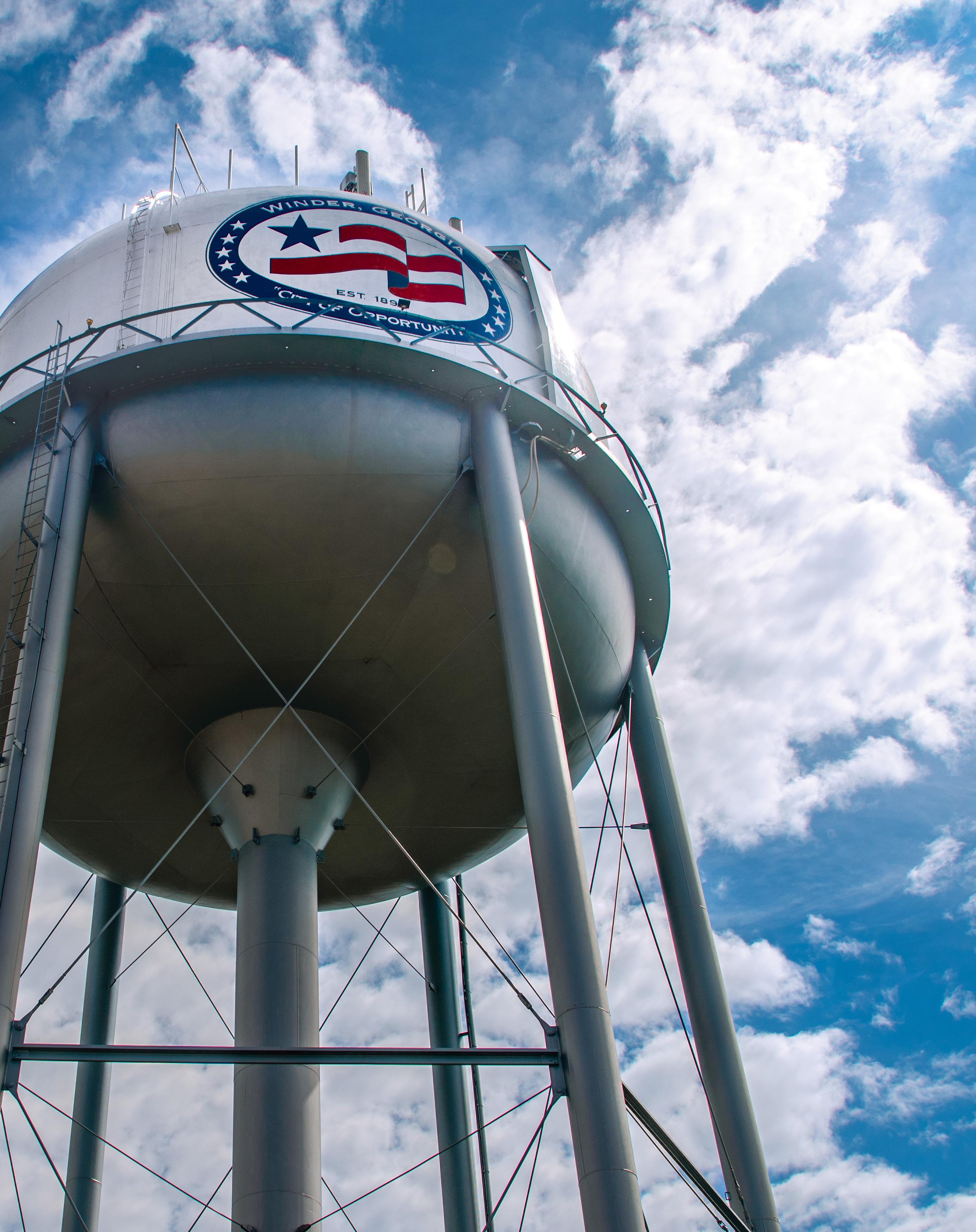
The Water and Sewer Fund is the largest of the enterprise funds operated by the City. The Water and Sewer Fund accounts for the operations of the water and sewer systems of the City. The system supplies water and sewer service to 51,000 users within the City of Winder and unincorporated Barrow County.
The Water and Sewer Fund has eight budget units: Utility Complex, Utility Warehouse, Water Treatment, Water Distribution, Cedar Creek Wastewater Treatment, Marburg Wastewater Treatment, Wastewater Collections, and Water Fund Debt Administration.
Revenues for the Water and Sewer Fund are generated by charges for services, or rates charged on the sale of water and sewer services. Rates are set annually by the City Council after analysis by external rate experts taking into consideration the cost for operations and maintenance, necessary improvements to infrastructure, and debt service for the fund.
Connection and capacity fees are also assessed against new developments coming onto the system in accordance with the Council’s policy that growth pays for itself.
Key financial ratios and trends* demonstrate the funds fiscal strength and health over time. As shown here, the water and sewer funds are improving year over year demonstrating the fund’s ability to meet its obligations, keep debt low, and live within its financial means.
* See RATIOS & TRENDS CONTENT, p17
Net position of a fund indicates the extent to which the funds assets (what it owns) exceeds its liabilities as well as sources (deferred inflows) and uses (deferred outflows) that will be recognized in a later year. Net position is an indication of fiscal health for an enterprise fund. Recommended practice is that an enterprise fund maintain an unrestricted net position equivalent to 25% of its annual expenditures.
Water & Sewer Fund - Unrestricted
WATER & SEWER UNRESTRICTED NET POSITION
Water & Sewer Fund - Unrestricted
FOUR-TIME PLATINUM AWARD WINNING WATER TREATMENT FACILITY BY THE GEORGIA ASSOCIATION OF WATER PROFESSIONALS
FOUR-TIME CERTIFICATE OF ACHIEVEMENT FOR MUNICIPAL WASTER TREATMENT BY GAWP
ELEVEN-TIME GOLD AWARD WINNER WATER AND WASTEWATER PLANT
THREE-TIME CERTIFICATE OF DISTINGUISHED MERIT
HIGHWAY 53 WATER TREATMENT PLANT
WATER FIRST COMMUNITY BY THE DEPARTMENT OF COMMUNITY AFFAIRS
The Gas Fund is the second largest of the City’s enterprise funds and accounts for the distribution and sale of natural gas in the City of Winder and the counties of Barrow, Walton, and Oconee. Natural gas sales are very seasonal in nature and are the highest during the colder months of the year.
Revenues are generated by charges for services based on volume of usage. The City of Winder purchases gas as a market commodity from the Municipal Gas Authority of Georgia and sells that gas to users at a rate designed to recover the commodity cost and the cost to operate and maintain the City’s transmission system.
Key financial ratios and trends* demonstrate the funds fiscal strength and health over time. As shown here, the gas fund is improving year over year, demonstrating the fund’s ability to meet its obligations, keep debt low, and live within its financial means.
* See RATIOS & TRENDS CONTENT, p17
Net position of a fund indicates the extent to which the funds assets (what it owns) exceeds its liabilities as well as sources (deferred inflows) and uses (deferred outflows) that will be recognized in a later year. Net position is an indication of fiscal health for an enterprise fund. Recommended practice is that an enterprise fund maintain an unrestricted net position equivalent to 25% of its annual expenditures.
Gas - Unrestricted
Gas - Unrestricted
Total Revenues
Total Revenues
Total Expenditures
Total Expenditures
Unrestricted Net Position
Unrestricted Net Position
Months of Unrestricted Net Position
Months of Unrestricted Net Position
The Stormwater Fund provides operations and maintenance of the City’s infrastructure that manages stormwater and stormwater runoff. This fund ensures that public spaces and private property are not damaged by stormwater or run-off from other properties. The Stormwater Department manages the City’s floodplains, streams, and ponds and constructs pipes, ditches, catch basins and similar features to manage the flow and ensure the quality of water in our environment.
Stormwater Fund revenues are generated by a stormwater fee charged to a piece of property and collected on that property’s annual tax bill. The fee is determined based on the pervious versus impervious surface area on the property as this is a measure of how much water can be absorbed by or held on that property versus how much water will run off that property to another. Although this fee is collected on the property tax bill, it is not a tax, and is separate from the property tax.
The City of Winder was awarded approximately $6 million in ARPA COVID-19 funds, half to be funded in FY22. The Council dedicated the full $6 million to eliminating flooding at the Center Street underpass.
Key financial ratios and trends* demonstrate the funds fiscal strength and health over time. As shown here, the stormwater fund is improving year over year, demonstrating the fund’s ability to meet its obligations, keep debt low, and live within its financial means.
Net position of a fund indicates the extent to which the funds assets (what it owns) exceeds its liabilities as well as sources (deferred inflows) and uses (deferred outflows) that will be recognized in a later year. Net position is an indication of fiscal health for an enterprise fund. Recommended practice is that an enterprise fund maintain an unrestricted net position equivalent to 25% of its annual expenditures.
Total Expenditures
Unrestricted Net Position
The Solid Waste Fund, also known as the Sanitation Fund, provides garbage, recycling, bulk waste, and yard debris. In FY21 and FY22 these services were provided to residents through contracts with Waste Management and ESG Operations.
During FY21, Council implemented a street sweeping pilot program to determine if offering weekly Citywide sweeping of streets would reduce the amount of litter and debris circulating into our storm drains, ditches, culverts, and other areas that cause unsightliness and can create flooding. The pilot program was such a success that street sweeping was implemented as a weekly, routed, year round service in FY22.
In addition, Council extended yard debris pick up to a year-round, rather than seasonal service, and placed the service on a weekly route.
Revenues for this fund are generated through charges for services, charged to customers. Rates are approved by Council to recover the cost of contracts with providers and support other overhead expenses.
Key financial ratios and trends* demonstrate the funds fiscal strength and health over time. As shown here, the solid waste fund is improving year over year, demonstrating the fund’s ability to meet its obligations, keep debt low, and live within its financial means.
Net position of a fund indicates the extent to which the funds assets (what it owns) exceeds its liabilities as well as sources (deferred inflows) and uses (deferred outflows) that will be recognized in a later year. Net position is an indication of fiscal health for an enterprise fund. Recommended practice is that an enterprise fund maintain an unrestricted net position equivalent to 25% of its annual expenditures.
Solid Waste - Unrestricted
Solid Waste - Unrestricted
The City of Winder purchased the Chimneys Golf Course in 2013 as the greens serve as an integral part of the City’s wastewater treatment process, irrigating the greens with an innovative land application system. Prior to fiscal year 2022 the Chimneys Golf Fund was not self-sustaining and required an annual transfer from the General Fund.
Council members heard the outcry from constituents and formed a vision for the future of Chimneys Golf course—make it profitable or sell it. Professional staff was engaged, competitive fees and rates charged, and strong business management practices were implemented.
By the end of FY21, the Golf Fund was self-sustaining, no longer requiring support from the City’s General Fund. By the end of FY22, the Golf Fund had experienced $490,504 change in net position from FY20.



This FY 2021 and FY 2022 PAFR is designed to provide citizens with a user friendly overview of the financial condition, accomplishments, and results of the City of Winder from adopted budgets and audited statements. Please find the budgets and audits for this PAFR at CityofWinder.com/Budgets

As you have seen, the leadership of Winder’s Mayor and Council demonstrated a commitment to financial stewardship and a marked change in the budgeting process in FY22 with the implementation of performance-based budgeting, special revenue funds, and capital improvement programming – all designed to ensure the health of City funds and the excellent delivery of services to our citizens.
CityofWinder.com
